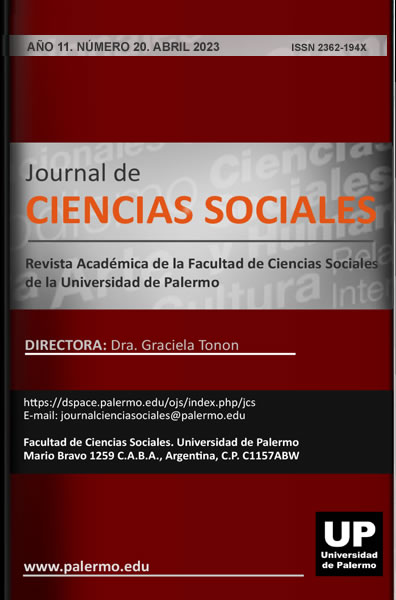La influencia de la UNRWA en el desarrollo del nacionalismo palestino
Resumen
Tras siete décadas al servicio exclusivo de los refugiados palestinos, el Organismo de Obras Públicas y Socorro de las Naciones Unidas para los Refugiados de Palestina en el Cercano Oriente (UNRWA por sus siglas en inglés) ha coadyuvado a perfilar, incluso de manera involuntaria, la evolución del nacionalismo palestino en el exilio. Tras la creación del Estado de Israel en 1948, aproximadamente el 70% de los palestinos se convirtieron en refugiados, quienes, sin un Estado propio que consolidara y estructurara una identidad nacional, debieron reconstruir sus identidades y lazos sociales en el exilio. En consecuencia, los carnés de identidad, las cartillas de racionamiento, los servicios de salud, pero, sobre todo, los campamentos de refugiados y el sistema educativo ofrecidos por la UNRWA influyeron de forma decisiva en la evolución de la identidad y la consecuente lucha palestina. El presente trabajo describe el surgimiento de la UNRWA y la evolución histórica de su relación con el colectivo de refugiados palestinos disperso en Oriente Medio, para posteriormente analizar el papel que tanto los campamentos de refugiados y las escuelas de esta agencia de Naciones Unidas han jugado en la evolución del nacionalismo palestino, así como los límites de la influencia de dicha institución y su instrumentalización por parte de otros actores palestinos.
Descargas
Citas
Abu Quevedo, J. (2002). La Cuestión Palestina: Identidad Nacional y Acción Colectiva [Tesis Doctoral no publicada]. Universidad Complutense.
Achilli, L. (2014). Disengagement from politics: Nationalism, political identity, and the everyday in a Palestinian refugee camp in Jordan. Critique of Anthropology 34(2), 234–257. https://doi.org/10.1177/0308275X13519276
Al Husseini, J. (1997, 19-21 septiembre). UNRWA and the Palestinian Nation-Building Process in the West Bank and the Gaza Strip. [Ponencia] Conferencia internacional The Peace Process and Future Visions of the Middle East, Lund University, Suecia.
Al Husseini, J. (2000). UNRWA and the Palestinian Nation-Building Process. Journal of Palestine Studies, 29(2), 51-64. https://doi.org/10.2307/2676536
Al Husseini, J. (2003). L’UNRWA et les réfugiés. Enjeux humanitaires, intérêts nationaux. Revue d’études palestiniennes, 86, 71-85. https://halshs.archives-ouvertes.fr/halshs-00383723
Barberet, S. (2001). Refugies ou diaspora palestinienne? Variations identitaires autour de la question du retour: Entre terroir originel, territoire national et pays d’attachement, [Memoria de investigación no publicada], Instituto de Estudios Políticos de Rennes, Francia.
Ben Hamida, E. (1988). Behind the Palestinian Uprising. A Journey through the Occupied Territories, Suiza, International Foundation for Development Alternatives.
Besson, Y. (1997). UNRWA and ist Role in Lebanon. Journal of Refugee Studies, 10(3), 335-348. https://doi.org/10.1093/jrs/10.3.335
Brand, L. A. (1988). Palestinians in the Arab World. Institution Building and the Search for State. Columbia University Press.
Bucaille, L. (1996). Un camp de réfugiés dans la bande de Gaza: interrogarions identitaires fase au processus de paix, Monde Arabe Maghreb-Machrek, 152, 113-122.
Droz, F. (2002). Le Club de Wehdat, un symbole d’affirmation identitaire pour les Palestiniens de Jordanie, [Memoria de licenciatura en Etnología no publicada], Universidad de Neuchâtel, Suiza.
Espín, J., Moreno, A. y Navarro, E. (2020). Supporting Israel by withholding support to International Organizations: UNRWA and UNESCO in Trump’s Foreign Policy. Revisa de Estudios Internacionales Mediterráneos REIM, 28, 25-42. https://doi.org/10.15366/reim2020.28.002
Farah, R. (1997). Crossing Bounderies: reconstruction of Palestinian Identities in Al-Baq’a refugee camp, Jordan. En R. Bocco, D. Blandine y J. Hannoyer (Dir), Palestine, Palestiniens: territoire national, espaces communautaires. Les Cahiers du CERMOC 17, 259-297.
Farah, R. (1999). Paradoxical and Overlapping Voices: the Refugee-UNRWA Relationship and Palestinian Identity in Jordan, [Ponencia no publicada] Simposio internacional. The Palestinian Refugees and UNRWA in Jordan, the West Bank and Gaza, 1949-1999, Centre d’Etudes et de Recherche sur le Moyen-Orient Contemporain (CERMOC). Mar Muerto, Jordania.
Farah, R. (2003). Palestinian refugee camps. Reinscribing and contesting memory and space. En A. Bashford y C. Strange (Eds.), Isolation: Places and Practices of Exclusion (181-196). Taylor and Francis Group.
Farah, R. (2006). Palestinian Refugees, Dethroning the Nation at the Crowning of the ‘Statelet’? Interventions: International Journal of Postcolonial Studies, 8(2), 228-252. http://dx.doi.org/10.1080/13698010600781040
Farah, R. (2013). Palestinian Refugees, the Nation, and the Shifting Political Landscape, Social Alternatives, 32(3), 41-47. https://www.academia.edu/9744688/Palestinian_Refugees_the_Nation_and_the_Shifting_Political_Landscape
Ghazzawi, H. (1989). La mémoire du village et la préservation de l’identité palestinienne. Cahiers d’Etudes Stratégiques, 14, 13-40.
Hanafi, S., Hilal, L. y Takkenberg, L. (Eds.) (2014). UNRWA and Palestinian Refugees. From Relief and Works to Human Development. Routledge.
Hart, J. (1999). Whose Future is it Anyway? Childre, UNRWA and “The Nation” [Ponencia] Simposio internacional. The Palestinian Refugees and UNRWA in Jordan, the West Bank and Gaza, 1949-1999, Centre d’Etudes et de Recherche sur le Moyen-Orient Contemporain (CERMOC). Mar Muerto, Jordania.
Irfan, A. E. (2019). Educating Palestinian Refugees: The Origins of UNRWA’s Unique Schooling System. Journal of Refugee Studies, 34(1), 1037-1059. https://doi.org/10.1093/jrs/fez051
Jaber, H. (1995). “Visite au camp de Jerash”. Revue d’Études Palestiniennes, 52(2), 15-19.
Jaber, H. (1996). Le camp de Wihdat, entre norme et transgression. Revue d’études palestiniennes, 8, 37-48.
Jung, D. (2001). Global Conditions and Global Constraints: The International Paternity of the Palestinian Nation [Ponencia] Convención de la Asociación de Estudios Internacionales de Hong Kong.
Latte Abdallah, S. (1995). Femmes dans les camps. Revue d’Études Palestiniennes, 52(2), 6-14.
Muslih, M. Y. (1988). The Origins of Palestinian Nationalism. Columbia University Press.
Oviedo, N. I. (2019). Legitimidad y organismos internacionales. Journal de Ciencias Sociales, 13. https://doi.org/10.18682/jcs.vi13.931
Pappe, Ilan (2004). A history of modern Palestine: one land, two peoples. Cambridge U. Press.
Peteet, J. M. (1995). Transforming trust. Dispossession and Empowerment among Palestinian Refugees. En E. Valentine Daniel y J. Cr. Knudsen (Eds.), Mistrusting Refugees (168-186). Universidad de California, L.A. https://doi.org/10.1525/9780520341234-012
Peteet, J. (2005). Landscape of Hope and Despair: Palestinian Refugee Camps. University of Pennsylvania Press.
Sayigh, R. (1977). The Palestinian Identity Among Camp Residents. Journal of Palestine Studies, 6(3), 3-22. https://www.jstor.org/stable/2535577
Sayigh, R. (1998). Dis/Solving the “Refugee Problem”. Middle East Report, 207. https://merip.org/1998/06/dissolving-the-refugee-problem/
Sayigh, R. (2010). Palestinian camp refugee identifications. A new look at the ‘local’ and the ‘national’. En A. Knudsen y S. Hanafi (Eds.), Palestinian refugees: Identity, space and place in the levant (pp. 50-63). Taylor & Francis Group.
Shabaneh, G. (2010). Refugees, International Organizations, and National Identity: The Case of Palestine. New Political Science, 32(2), 215-236. https://doi.org/10.1080/07393141003722057
Shabaneh, G. (2012). Education and Identity: The Role of UNRWA’s Education Programmes in the Reconstruction of Palestinian Nationalism. Journal of Refugee Studies 25(4), 491–513. https://doi.org/10.1093/jrs/fer055
Talavera, P. (1999). El valor de la identidad nacional. Cuadernos electrónicos de filosofía del derecho, 2, http://www.uv.es/CEFD/2/Talavera.html
Villa, J. D., y Barrera, D. (2017). Registro identitario de la memoria: políticas de la memoria e identidad nacional. Revista Colombiana de Sociología, 40 (Suplemento 1), 149-172. https://doi.org/10.15446/rcs.v40n1Supl.65911
Otros documentos consultados
Naciones Unidas, Asamblea General (8 de diciembre 1949). RES 302 (IV), Ayuda a los refugiados de Palestina. https://documents-dds-ny.un.org/doc/RESOLUTION/GEN/NR0/053/85/PDF/NR005385.pdf?OpenElement
Naciones Unidas, Asamblea General (11 de diciembre 1948). RES 194 (III), Palestina. Informe sobre el progreso de las gestiones del Mediador de las Naciones Unidas. https://digitallibrary.un.org/record/210025
UNRWA. (s.f. a). Frequently asked questions. https://www.unrwa.org/who-we-are/frequently-asked-questions
UNRWA (s.f. b) Where we work Lebanon https://www.unrwa.org/where-we-work/lebanon
UNRWA (2022). Annual operational report 2021. https://www.unrwa.org/sites/default/files/content/resources/2021_aor_eng_-_sept_20-2022_1.pdf
UNRWA España (s.f.). La geografía de los refugiados de Palestina. https://unrwa.es/mision/campos/
Los autores conservan los derechos sobre su obra garantizando a esta revista el derecho de primera publicación, comprometiéndose a citar el Journal de Ciencias Sociales como referencia de la publicación original.
Los trabajos publicados en el Journal se publican bajo los términos que se indican en la Licencia de Creative Commons con la Atribución 4.0 Internacional (CC BY 4.0).




























